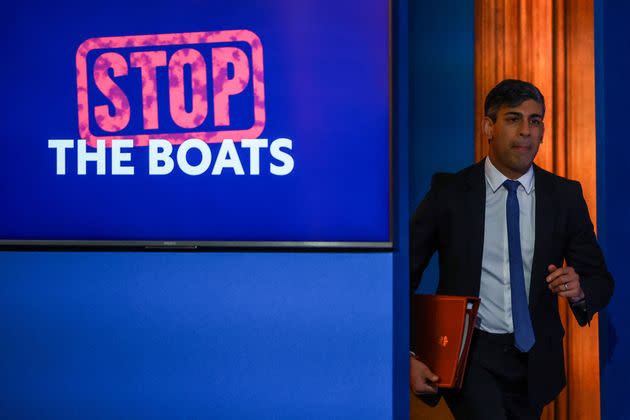Rwanda Deportation Plan Finally Gets Through Parliament After Months Of Delay

Rishi Sunak’s Rwanda deportation plan has finally made it through the parliamentary stalemate that has caused months of delay to his flagship immigration policy.
Legislation clearing the way for the one-way flights to east Africa to take off has been trapped in a game of political “ping-pong”, with the plan being held up by the House of Lords.
Both the houses of Lords and the Commons voted on the Safety of Rwanda Bill on Monday, with Sunak saying they would remain in session until the wording was approved.
Ministers were forced to give ground on one element of the bill, namely excluding those who worked with the UK military or government overseas, such as Afghan interpreters, from the policy.
But at around midnight, peers in the House of Lords ended their opposition after MPs refused to bow to their pressure to get Rwanda to be treated as a safe country only after verification from an independent monitoring body.
The Lords has surrendered to Sunak. “The time has now come to recognise the primacy of the other house” says Lord Anderson, sponsor of the last successful amendment. The PM has got his “Safety of Rwanda” Bill. In coming weeks, will Sunak celebrate or rue his victory, because if…
— Robert Peston (@Peston) April 22, 2024
At a press conference, Sunak said the first flights would take off in 10-12 weeks. The government has already chartered planes for the deportation flights, increased detention space, hired more immigration caseworkers and freed up court space to handle appeals, he said.
Britain and Rwanda signed a deal almost two years ago that would see migrants who cross the English Channel in small boats sent to the East African country, where they would remain permanently. So far, no migrant has been sent to Rwanda under the agreement.
The plan is key to Sunak’s pledge to “stop the boats” bringing unauthorised migrants to the UK. He argues that deporting asylum seekers will deter people from making risky journeys and break the business model of people-smuggling gangs.
The number of migrants arriving in Britain on small boats soared to 45,774 in 2022 from just 299 four years earlier as people seeking refuge pay criminal gangs thousands of pounds to ferry them across the channel.
Last year, small boat arrivals dropped to 29,437 as the government cracked down on people smugglers and reached an agreement to return Albanians to their home country.

